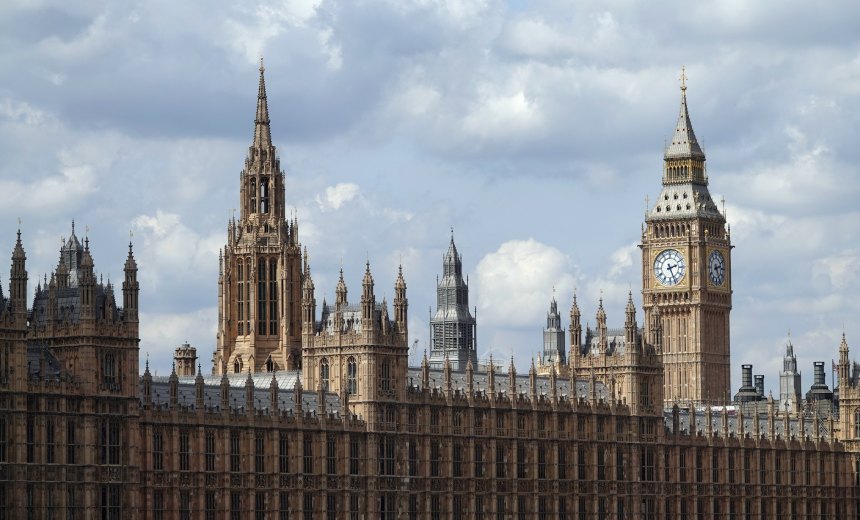General Data Protection Regulation (GDPR)
,
Geo Focus: The United Kingdom
,
Geo-Specific
Data Protection and Digital Information Bill Heads to the House of Lords

British Conservative lawmakers are pushing ahead with legislation modifying the U.K. codification of European privacy law despite objections from privacy advocates and concerns about the legislation’s impact on European trade. Government backers say the bill will bolster the domestic AI industry.
See Also: EU-US Data Privacy Framework: Your Questions Answered
The Digital Protection and Digital Information Bill cleared the House of Commons on Thursday and now heads to the House of Lords.
According to its government backers, the bill will improve data security, prevent fraud and bolster the domestic artificial intelligence industry.
“The current one-size-fits-all, top-down approach to data protection that we inherited from the European Union has led to public confusion, which has impeded the effective use of personal data to drive growth and competition,” said Minister for Data and Digital Infrastructure John Whittingdale in remarks before Parliament on Wednesday.
Whether the bill becomes law may depend on when Prime Minister Rishi Sunak calls a general election that polls currently suggest his Conservative party would lose. Should Sunak delay the election until fall, “then there is more of a possibility of it becoming law although this is by no means guaranteed,” said Jonathan Armstrong of law firm Cordery Compliance.
Reintroduced into Parliament in March, the bill underwent significant modification before being sent to the House of Lords (see: UK Reintroduces Bill Proposing Modifying Country’s GDPR).
The amendments include allowing a court to determine if a data subject and intelligence agencies have the right to access data, granting the secretary of state more power to obtain social security information for law and order purposes, removing the veto power of the Information Commissioner’s Office and allowing British law enforcement agencies to retain biometric data such as fingerprints and DNA profiles for criminal conviction purposes.
The volume of amendments and the brevity of their consideration has drawn criticism from opponents. Additions to the bill “give very extensive new powers to ministers, and they introduce completely new topics that have never been previously mooted,” said Chris Bryant, a Labour representative, on Wednesday. “Sadly, it is part of a growing trend: Legislate at speed; repent at leisure.”
Pam Cowburn, head of communications and campaigns at Open Rights Group, which opposes the bill, told Information Security Media Group that the government “is intent on pushing the bill through despite the concerns of privacy campaigners, trade unions and many other organizations.”
The Sunak administration envisions the bill making it easier for British companies to transfer data abroad, advancing the United Kingdom into “the world’s most attractive data marketplace,” according to analysis conducted by the Department for Digital, Culture, Media and Sport. Removing legal hurdles on data transfers could enhance foreign direct investment. The government says low levels of investment stymie British AI startups (see: UK’s AI Leadership Goal ‘Unrealistic,’ Experts Warn).
Critics contend the government is ignoring the risks posed by the rapidly developing technology. The bill does not provide an effective framework for governing high-risk data-driven technologies – such as live facial recognition and AI foundation models,” said Michael Birtwistle, associate director at the Ada Lovelace Institute. “In fact, it actually weakens the safeguards that currently exist in U.K. law to protect people,” he told Information Security Media Group.
Birtwistle said the bill poses a good opportunity for the U.K. government to build on its promise made at the U.K. AI Safety Summit and prioritize “making data and AI work for people and society.”
In the days leading up to the bill’s approval by the House of Commons, Open Rights Group wrote that the bill “lowers standards and removes protections and redress mechanisms against harmful uses of artificial intelligence.” Should it become law, it would allow automated decision-making to “amplify biases that exist in everyday life.”
Multiple group have raised concerns that heavy modifications of the UK GDPR could jeopardize commercial data flows with members of the European Union. Even after its 2020 withdrawal from the trading block, the U.K. still depends on European regulators’ opinions of its data protection regulations. Without what the European Commission dubs a finding of adequate protection, commercial data flows depend on cumbersome case-by-case contractual mechanisms, and even those could be prohibited by European courts.
The European Commission in 2021 made an adequacy finding for the U.K. but limited its duration to just four years. European officials said they have introduced the sunset clause out of concern that Parliament could separate the U.K. privacy framework from the GDPR.
Government officials have downplayed concerns that Europe would revoke its adequacy determination should the bill become law (see: UK Parliament Hears Assurances on GDPR Adequacy).
“Even if passes, it might not be fatal to the U.K.’s adequacy decision,” said Armstrong. “The U.K. needs to have equivalent legislation, but that does not need to be identical. Having said that, I do have concerns about the large number of amendments.”
